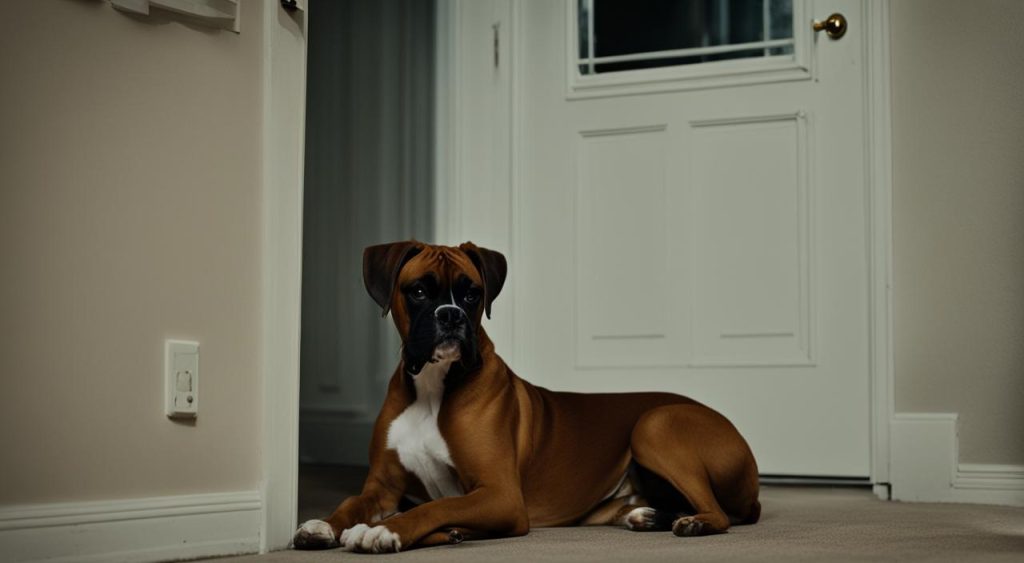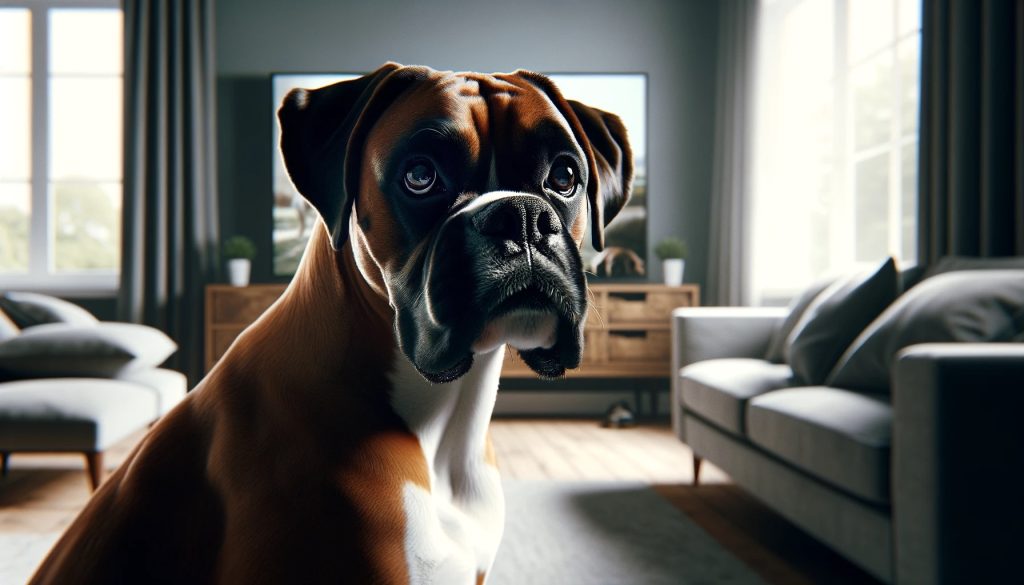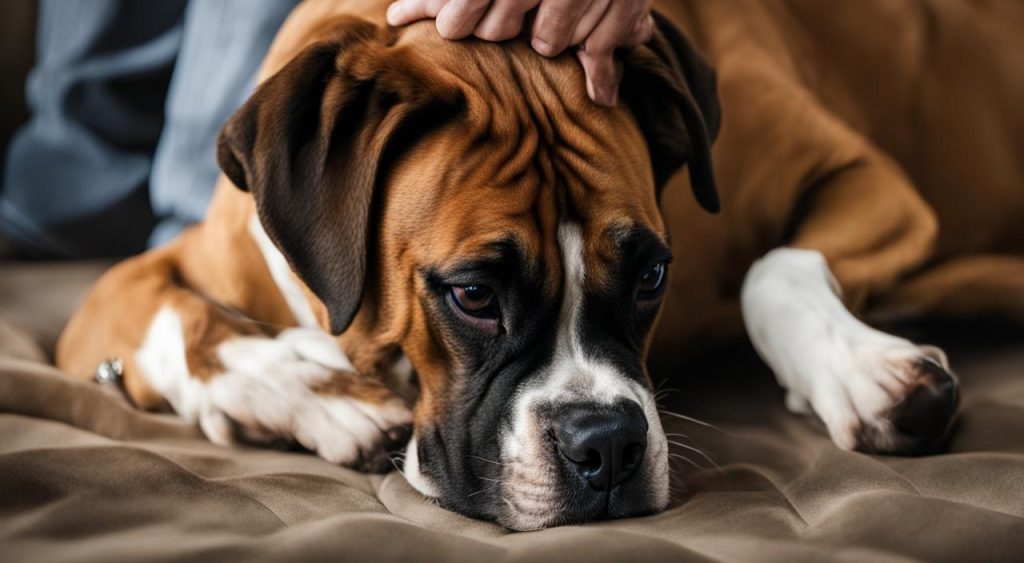Leaving your Boxer home alone is a necessary part of life and something you need to equip your dog to happily handle. If necessary, a Boxer can be left home alone for the average work day without any problems, but it requires careful planning and you need to gradually ease your dog into it.
To leave a Boxer home alone successfully, and without causing your dog distress, follow these 15 simple steps. Make sure you have quality playtime and/or a long walk before you leave for work. Provide engaging toys like stuffed KONGs or puzzle games. Ensure that your house is safe and free from hazards. Consider leaving on the air conditioner or providing a shaded spot outside. Set up a camera to monitor your dog’s behavior. Create a comfortable spot for your dog to lie in the sun or observe the surroundings. Start by leaving your dog alone for short periods of time and gradually increase the duration. Use baby gates or a crate to confine your dog to a safe area. Consider hiring a dog walker or pet sitter for longer periods alone. Remember not to make a big deal out of leaving or returning home to help prevent separation anxiety. Play calming music or leave on a TV or radio at low volume. Consider using a fluffy toy with a simulated heartbeat for comfort. Use these strategies in combination to help your Boxer adjust to being home alone and prevent destructive behavior.
Key Takeaways:
- Leaving a Boxer home alone requires careful planning and gradual training.
- Ensure your Boxer is exercised and mentally stimulated before leaving.
- Provide engaging toys and a safe environment.
- Consider using baby gates or a crate to confine your Boxer.
- Monitor your dog’s behavior using cameras and address any issues.
Tips for leaving a Boxer alone
When it comes to leaving your Boxer alone, it’s important to train them gradually to be comfortable with solitude. Start by incorporating short absences into your puppy’s routine right from the beginning. Begin with leaving for just 5 minutes and gradually increase the duration.
Prior to leaving for work, make sure your Boxer is properly exercised and mentally stimulated. This will help tire them out and keep their minds occupied while you’re away. Provide engaging toys like KONGs or puzzle games to keep them mentally stimulated and entertained.
Ensuring a safe environment is crucial when leaving your Boxer alone. Check that your home is free from any hazards and consider using baby gates or a crate to confine your Boxer to a designated area where they feel secure.
If you anticipate longer periods of alone time, it may be beneficial to hire a reliable dog walker or pet sitter. This will provide your Boxer with additional companionship and attention when you’re unavailable.
Using cameras to monitor your dog’s behavior can be helpful in identifying any issues or signs of distress. Additionally, leaving calming music or a TV/radio on can help provide comfort and minimize feelings of loneliness.
Another strategy to consider is using a fluffy toy with a simulated heartbeat. This can provide a sense of security and companionship for your Boxer when they’re alone.
Lastly, avoid making a big fuss when leaving or returning home to prevent separation anxiety. By following these tips and combining them in a way that suits your Boxer’s needs, you can help them adjust to being alone and reduce the likelihood of destructive behavior.
Boxer Breed and Alone Behavior
Boxers are a breed that generally tolerates being left alone for moderate periods of time. However, it’s important to gradually train them to be comfortable with solitude and provide them with the necessary mental and physical stimulation.
Boxers are intelligent, high-energy dogs that need companionship and exercise. They prefer to be in the company of their owners and can become destructive if left alone for extended periods without proper training and stimulation.
It’s important to ensure that they have plenty of exercise and mental stimulation before leaving them alone. Regular walks and engaging playtime sessions can help keep them content and prevent boredom-related behaviors.
“Boxers are loyal pets and can be protective of their family and home. They may vocalize their concerns by growling or barking if they sense a threat.”
Boxers thrive in households where they receive ample attention and exercise. They can do well in various living situations, but their owners need to devote time to their physical and mental well-being.
In hot weather, Boxers are prone to heat stress and should be protected from extreme temperatures. Similarly, their short coat makes them vulnerable to the cold, so proper measures should be taken to keep them warm in colder climates.
By taking these factors into account and providing the necessary training, exercise, and mental stimulation, you can help your Boxer adjust to being alone and prevent destructive behavior.
Conclusion
Leaving a Boxer alone is a common part of daily life, but it requires careful planning and training to ensure your dog’s well-being and prevent destructive behavior. Gradually training your Boxer to be comfortable with solitude and providing them with mental and physical stimulation is key to a successful alone time.
When leaving a Boxer alone, it’s important to incorporate short absences from a young age and gradually increase the duration. Before leaving, make sure to exercise and mentally stimulate your dog to help reduce any pent-up energy. Provide engaging toys and create a safe environment free of hazards.
Consider using baby gates or a crate to confine your Boxer to a designated area where they feel secure and comfortable. If needed, hire a reliable dog walker or pet sitter to provide companionship during longer periods alone. Use cameras to monitor your dog’s behavior and address any issues promptly.
Remember to leave calming music or a TV/radio on to provide comfort, and consider using a fluffy toy with a simulated heartbeat for added reassurance. By following these tips and providing a safe and stimulating environment, you can help your Boxer adjust to being alone and prevent destructive behavior. Be patient, consistent in your training, and give your Boxer the attention and exercise they need when you’re home.





